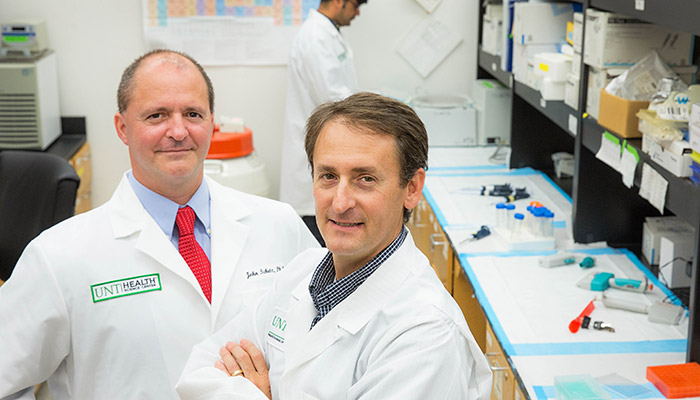New strategies for treating strokes
By Jan Jarvis
When someone has an ischemic stroke – meaning a brain blood vessel is blocked – every minute counts in the race to reduce damage.
But getting the clot-busting drug tPA in time is challenging for the 800,000 Americans who experience a stroke each year, said John A. Schetz, PhD, Professor of Pharmacology & Neuroscience in the Center for Neuroscience Discovery.
“You have to get to the hospital within three to four hours – and not just any hospital but one with a certified stroke center,” Dr. Schetz said. “Only about 10 percent of stroke victims get to the right hospital in time, and only 10 to 15 percent of those who do actually benefit.”
Knowing that so few people get treated in time, two UNTHSC researchers are working on a way to provide delayed treatment between 24 hours and 48 hours after a stroke – and still prevent or reduce disabilities. And they’re doing so by studying drugs that already have been approved by the Food and Drug Administration, a strategy that reduces time and expense.
Delaying treatment requires a different mechanism of action than the one used by tPA, Dr. Schetz said.
“You can’t prevent the initial damage caused by a stroke, but you can prevent spreading damage that occurs over time. And importantly, you can promote restoration,” he said. “You can use therapeutic approaches to greatly enhance the body’s own repair mechanism.”
Grants from the National Institute of Neurological Disorders and Stroke and from the William and Ella Owens Medical Research Foundation are helping fund discovery and development of drugs that could be effective even when administered days after a stroke has occurred.
By studying FDA-approved drugs that have been proven to be safe and effective for other conditions, the researchers hope to move a stroke medication from bench to bedside faster, said Derek Schreihofer, PhD, Associate Professor, Center for Neuroscience Discovery.
“We drastically reduce time spent testing for safety, toxicity and side effects because these drugs are already being used safely for other conditions,” Dr. Schreihofer said. “Our hope is to identify at least two effective compounds and then fast-track a drug that is going to work for treating strokes.”
Such a drug could have an enormous impact on those individuals who get medical care too late – because they live too far from a stroke center or fail to recognize the symptoms and seek help in time.
There is currently only one FDA-approved drug treatment for acute ischemic stroke and it must be given within four hours via intravenous injection. With this type of treatment it is critically important that a patient first has a brain scan to ensure the treatment is safe to give. Once too much time has passed, the treatment cannot be given because it can actually endanger the patient.
“We are interested in helping a far greater number – those who get to the hospital later,” Dr. Schetz said. “With our innovative approach it might even be possible to provide some benefit to people who suffered a stroke weeks, months or perhaps even years earlier.”





Social media